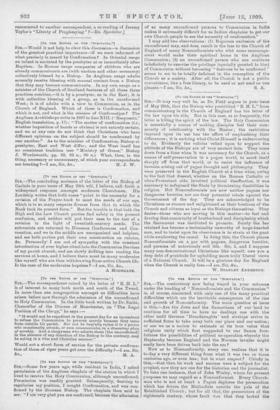LTO Toe EDITOR OF TRU " SPIOTATOR."1
Sin,—It may very well be, as Dr. Field argues in your issue of May 29th, that the Bishop who prohibited "E. M. L." front communicating in the Church of England has the letter of the law upon his side. But in this case, as so frequently, the letter is killing the spirit of the law. The Holy Communion is essentially a means of making disciples feel their com- munity of relationship with the Master ; the restriction imposed upon its use has the effect of emphasising their differences ; it is undoing what Christ Himself is endeavouring to do. Evidently the rubrics relied upon to support the attitude of the Bishops are of very ancient date. They come down from a time when it was necessary for the Church, as a means of self-preservation in a pagan world, to mark itself sharply off from that world, or to resist the influence of heresies arising out of pagan thought and philosophy. They were preserved in the English Church at a time when, owing to the fact that dissent, whether on the Roman Catholic or ultra-Protestant side, involved political disaffection, it was necessary to safeguard the State by threatening disabilities in religion. But Nonconformists are now neither pagans nor dangerous heretics, nor are they potential rebels against the Government of the day. They are acknowledged to be Christians as sincere and enlightened as their brethren of the Church and citizens as loyal as the Bishops themselves. They desire—those who are moving in this matter—to feel and develop that community of brotherhood and discipleship which the Sacrament was instituted to promote. Surely the bar retained has become a technicality unworthy of large-hearted men, and to insist upon its observance is to strain at the gnat while swallowing the camel. In doing this, the Church places Nonconformists on a par with pagans, dangerous heretics, and persons of notoriously evil life, Sir, I, and I suppose many non-denominational Christians like myself, owe you a deep debt of gratitude for upholding more truly liberal views of a National Church. It will be a glorious day for England when the Church is really free.—I am, Sir, &c.,
W. STANLEY ANDERTON.










































 Previous page
Previous page